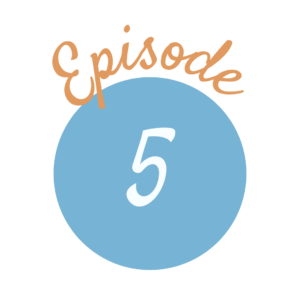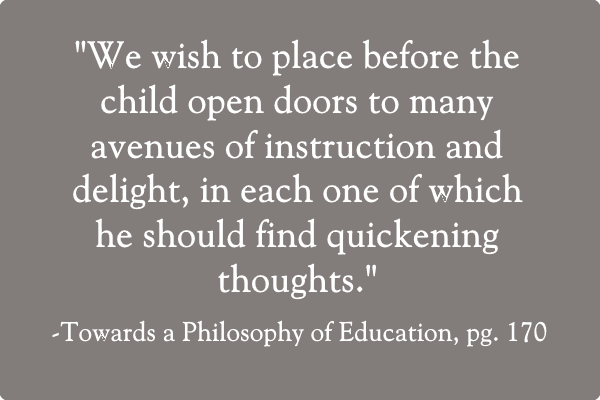
One thing leads to another, it is said, but the powerful interrelation of knowledge and experience Mason identified is the process we must recognize and capitalize on in teaching. She called it the “science of relations” and this episode is an animated discussion that not only defines what Mason meant, but is packed with descriptions of how these three women have observed the process at work in their children’s lives. This truly is the exciting aspect of teaching, observed in themselves and their children.
Listen Now:


(11) But we, believing that the normal child has powers of mind which fit him to deal with all knowledge proper to him, give him a full and generous curriculum; taking care only that all knowledge offered him is vital, that is, that facts are not presented without their informing ideas. Out of this conception comes our principle that,–(12) “Education is the Science of Relations”: that is, that a child has natural relations with a vast number of things and thoughts; so we train him upon physical exercises, nature lore, handicrafts, science and art, and upon many living books, for we know that our business is not to teach him all about anything. “Those first-born affinities that fit our new existence to existing things.” (Preface to the Home Education Series)
“The mind can know nothing but what it can produce in the form of an answer to a question put by the mind itself.” (Parents and Children, pg. 218)
“A small English boy of nine living in Japan, remarked, ‘Isn’t it fun, Mother, learning all these things? Everything seems to fit into something else.’ The boy had not found out the whole secret; everything fitted into something within himself.” (Towards a Philosophy of Education, pgs. 156-57)
“Much of what we have learned and experienced in childhood, and later, we cannot reproduce, and yet it has formed the groundwork of after knowledge; later notions and opinions have grown out of what we once learned and knew. That is our sunk capital, of which we enjoy the interest though we are unable to realise.” (Home Education, pg. 154)
“At the same time, the child’s capacity for knowledge is very limited; his mind is, in this respect at least, but a little phial with a narrow neck; and, therefore, it behooves the parent or teacher to pour in only of the best.” (Home Education, pg. 175)
“You will see at a glance, with this Captain Idea of establishing relationships as a guide, the unwisdom of choosing or rejecting this or that subject, as being more or less useful or necessary in view of a child’s future. We decide, for example, that Tommy, who is eight, need not waste his time over the Latin Grammar. We intend him for commercial or scientific pursuits,––what good will it be to him? But we do not know how much we are shutting out from Tommy’s range of thought besides the Latin Grammar. He has to translate, for example,––’Pueri formosos equos vident.’ He is a ruminant animal, and has been told something about that strong Roman people whose speech is now brought before him. How their boys catch hold of him! How he gloats over their horses! The Latin Grammar is not mere words to Tommy, or rather Tommy knows, as we have forgotten, that the epithet ‘mere’ is the very last to apply to words. Of course it is only now and then that a notion catches the small boy, but when it does catch, it works wonders, and does more for his education than years of grind. Let us try, however imperfectly, to make education a science of relationships––in other words, try in one subject or another to let the children work upon living ideas. In this field small efforts are honoured with great rewards, and we perceive that the education we are giving exceeds all that we intended or imagined.” (School Education, pgs. 162-63)
“Children can be most fitly educated on things and books.” (School Education, pg. 214)

If you would like to study along with us, here are some passages from The Home Education Series and other Parent’s Review articles that would be helpful for this episode’s topic. You may also read the series online here, or get the free Kindle version from Fisher Academy.
School Education, chapters VII, XVII, and XVIII
Towards a Philosophy, Introduction and chapter I

Carry On, Mr. Bowditch, Jean Lee Latham
America Moves Forward, Gerald Johnson
Rip van Winkle, Washington Irving
Benjamin West and His Cat Grimalkin, Marguerite Henry
The Romance of Chemistry, Keith Irwin
Madame How and Lady Why, Charles Kingsley
The Last Child in the Woods, Richard Louv
(Contains affiliate links)








*sigh* Love this CM life we are learning to live with our families! This was fantastic once again! I can't tell you how encouraging it is at the end of a long week to listen in to this and be inspired, challenged, and learn with you gals!
I can't tell you how encouraging it is at the end of a long week to listen in to this and be inspired, challenged, and learn with you gals!
I really loved all your examples of your own children's connections…I love jotting down when those things happen at my house occasionally, so I never forget. And I can't tell you the glee that I personally get when I make a connection MYSELF. LOL! It's actually pretty ridiculous how excited I get. I am learning SO much with my children.
I am learning SO much with my children.
I really loved how you talked about connections can come from all sorts of things and don't have to be manufactured or in "order" so to speak. This really helps when the whole worrying about "gaps" conversations come up or if you start to struggle with am I doing enough etc!
You touched on the broad subject feast, but a deep tasting of one area in those subjects…sooooo good. Thank you! That really helps me…ALL of history can seem OVERWHELMING, but instead, fostering a few good relationships with the people of history, battles, things…I've seen so much come alive that way versus the bigger spines that touch on many things.
I'm so glad you talked about the THINGS aspect of a CM education…I struggle a bit more in this area…I'm a reader and LOVE that part ;), but just tiredness with a bigger family or laziness on my part has kept me from some of the creating aspects. This really encouraged me and spurred me on! I've been looking through some library books on handcrafts and thinking towards Christmas with a mind on how we can incorporate some of this…my children are going to be wild with excitement! On the flip side, I am glad to say that my leaving it alone has at times really given them the space to create and pursue things on their own. Drawing comes to mind. Not perfect or technical yet persae, but they are interested, seeking out new books, better drawing materials, etc. And I didn't do anything! Just helped them get the stuff. So just be a bit more proactive to provide the materials and bring them to the places will really help! I think I think TOO BIG sometimes in this area! Like a handicraft has to be a HUGE production and then that scares me away. All the things aspect remind me to use our time wisely. Are we on the go too much? Are we watching too many videos? Are we staying on task faithfully to household routines so that we have time for creating, listening to music, and drawing etc? So that helps me take a good look around here and tweak some things!
All the things aspect remind me to use our time wisely. Are we on the go too much? Are we watching too many videos? Are we staying on task faithfully to household routines so that we have time for creating, listening to music, and drawing etc? So that helps me take a good look around here and tweak some things!
I love what Nicole was saying about the beauty of a lot of this is that it happens naturally!
Lastly (maybe! :P), I heard of a book called Better Than School…it is from the 80's and the family was more unschooling than CM, I think, but I'm really enjoying it and a lot of what was talked about here, I've been reading in this sweet book! I'm get such a happy feeling welling up in me, when the little boy in the book gets to read and learn and all the connections they are making!!!
(maybe! :P), I heard of a book called Better Than School…it is from the 80's and the family was more unschooling than CM, I think, but I'm really enjoying it and a lot of what was talked about here, I've been reading in this sweet book! I'm get such a happy feeling welling up in me, when the little boy in the book gets to read and learn and all the connections they are making!!!
THANK YOU!
Oh, and a question – on habits, I'm trying to figure out how to work on specific things with individual children when one has a big family??? Any thoughts?
– on habits, I'm trying to figure out how to work on specific things with individual children when one has a big family??? Any thoughts? 
Amy
Amy,
Speaking of connections, it is wonderful for us to make connections with some of the friends we've made and have out their in cyberspace, especially that our conversations are including you. We are all on this journey together and it's encouraging for us to hear from you and your insights and experiences. We will add your question to our growing list and will probably be doing a Q&A podcast before long. It sounds like you are learning what we are learning too–that the children will do the learning if we let them and stop hindering them with our own feelings of inadequacy. Truly, there isn't enough mommy to go around, but there is more than enough knowledge to feed their
hungry souls.
Liz